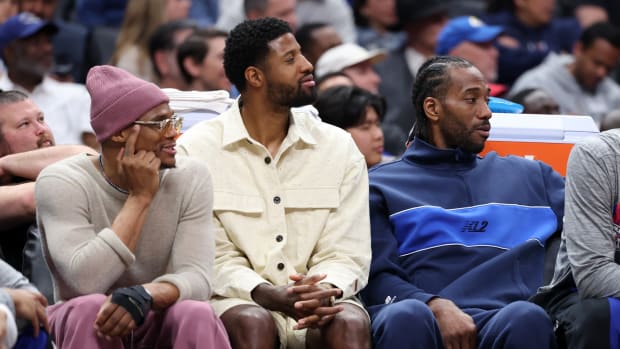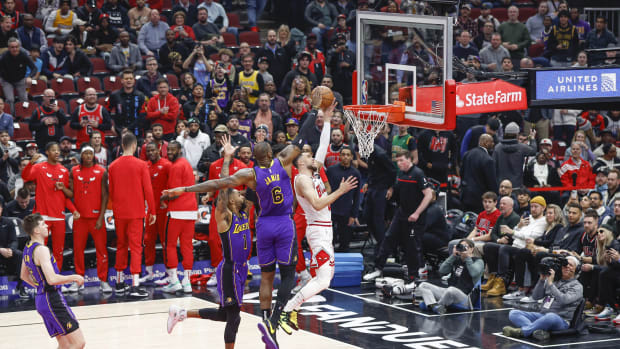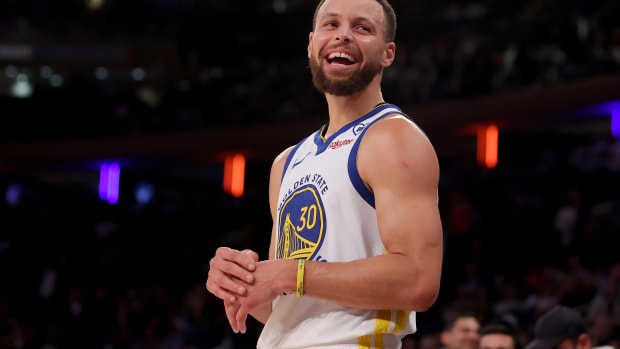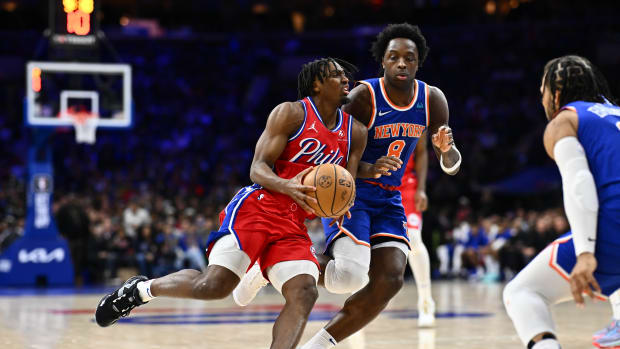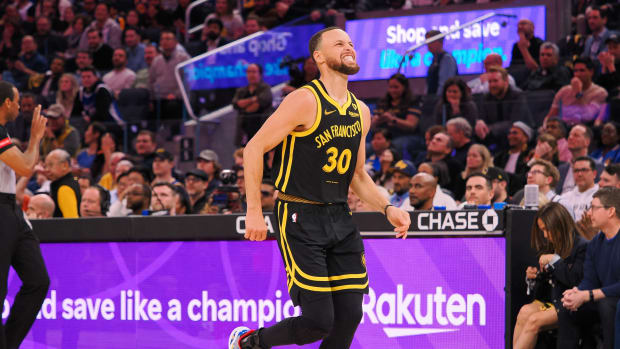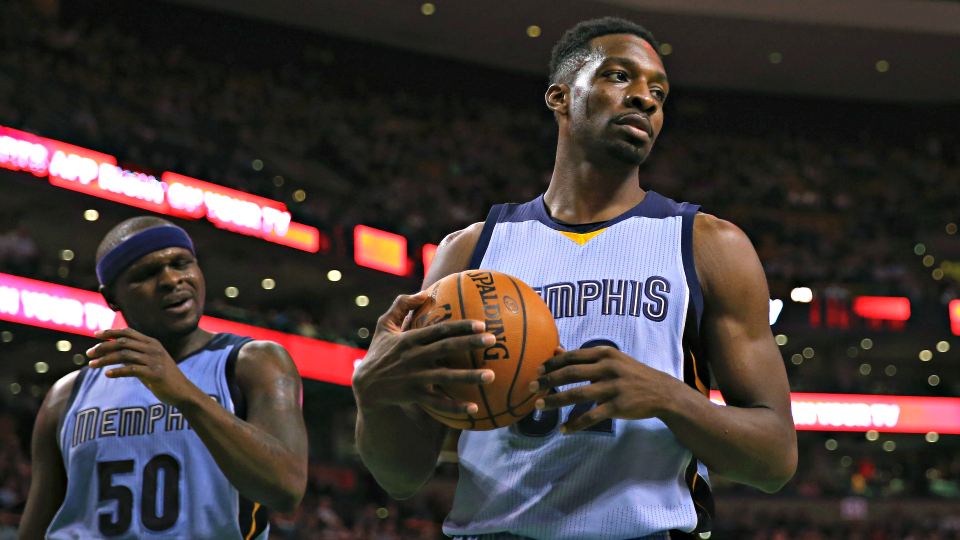
The Fundamentals: Grizzlies grounded by starting lineup's recent struggles
In a field as competitive as this year's Western Conference, a contender can only be measured by its caveats. Some of the best teams in the league will be undone by minor deficiencies—their seasons ended by the inability to deal with specific play actions, handle a certain strain of matchup, or execute against particular kinds of defensive pressure. Playoff series are waged in broad terms but ultimately won in micro.
It's for this reason that some slight issue must be raised regarding the Memphis Grizzlies, currently the second-best team (45-19) in the Western Conference by record. Memphis is a contender without question. Yet it's currently so in spite of its starting lineup, a true rarity among teams of this caliber. Since bringing Jeff Green into the starting five in mid-January, the Grizzlies' starters have given up more points than they've earned. If that general trend wasn't concerning enough, the deficit seems to be getting worse:
In three of Memphis' last five games, the starters have been both the Grizzlies' most-played lineup and a significant net negative. Therein lies the peril; since acquiring Green from the Celtics mid-season, the Grizzlies have tweaked their rotation to give significant playing time to a lineup currently operating at a loss. Of the 12 most-played lineups from around the league, only three are outscored by their opponents on balance: The Lakers' original, doomed starters, the Nuggets' since-dismantled starters, and the Grizzlies' first line.
The All-Bullseye Team: Five players facing the postseason microscope
The cost of acquiring Green, then, was heavier than just Tayshaun Prince, Quincy Pondexter, and a future second-round pick. Memphis' starters before the deal (with Tony Allen in Green's stead) performed as one would expect a contender's should. There was a clear balance to that group's operations that bore out in the bottom line. Allen's talents were best used against first-run scorers, Courtney Lee's shooting helped offset Allen's offensive shortcomings, Marc Gasol and Zach Randolph were dually assertive and Mike Conley made a perfect complement on both sides of the ball.
Prior to the trade, that specific lineup—which outscored opponents by 7.9 points per 100 possessions—accounted for nearly 20 percent of the Grizzlies' total minutes. In the 27 games since, that share has shriveled to just 6.6 percent. The question of which players ought to start for Memphis, 4-5 in its last nine games, isn't some superficiality. Dave Joerger's current rotation allows the opening lineup more minutes than any other five-man grouping, which in turn exaggerates the disparity between starters past and present.
There is a certain foresight to the Grizzlies' investment in Green as a starter. Joerger and his staff know all too well the costs of playing Allen big minutes in the postseason, where his complete inability to shoot undercuts even the team's best attempts at offense. Opposing defenders can wander from Allen without worry to crowd whomever needs crowding, safe in the knowledge that a swing pass won't much hurt them too much. When Allen shoots, the defense wins. When Allen drives—taking his wild, haphazard show on the road—the defense likely still wins.
Green is a theoretical out. On his best days, the logic of his inclusion is self-evident: Green can be a big, dynamic influence on an offense that can occasionally use some zest, and his willingness to shoot separates him from the likes of (the since-traded) Prince. Just as often, however, Green sputters. His offense comes and goes, and when on leave it makes his inattentive defense all the more painful.
Trends: Which NBA teams are surging, swooning heading into home stretch?
In a sense, Green's starting role is an extension of Memphis' Tony Allen problem. The Grizzlies' defense hasn't consistently worked without Allen in the lineup this season, hemorrhaging points at a bottom-10 rate whenever he's off the floor. Yet the issue of playoff opponents taking advantage of Allen's specific limitations is both real and inevitable. Joerger desperately needs a workaround and has tried for almost two months to manufacture one. Green, who neither gives the offense the space it needs nor the defense the tenacity it feeds on, just hasn't been the right fit.
This is also less a flaw in Green's individual game than the way he fits the collective. He has clear value to the Grizz in size and skill, though while playing with the starters Green is a bit more assertive than is wise. Overall he attempts roughly the same number of shots per minute within that lineup as Gasol, Conley, and Randolph. That equality should not be mistaken for balance. An attempt from Green doesn't carry the weight or return as one from Memphis' stars, making his insistence on that end of the floor bothersome.
To be fair, Green's teammates aren't providing the healthiest framework. Part of the reason Green asserts himself as he does is that the shot distribution naturally allows it. Gasol is again too content to roll through the offense as a mere participant rather than a high-volume weapon. Conley, who looked worn down even before tweaking his ankle on Wednesday, hasn't been able to exert the same level of creative influence he did earlier in the season. Lee's long-range shooting has cooled from month to month—from 52.8 percent in November all the way to a frigid 25 percent in March thus far—leaving the lineup without its chief long-range counterpoint.
Memphis could make do with all of that if its starters were playing up to par defensively. That just hasn't been feasible without Allen, whose specific work in lockdown situations transcends his matchup. Lee and Green are lacking substitutes—the former despite his hard work and best intentions and the latter due to no comparison whatsoever. The most significant, recurring issues arise in defensive exchange. Allen has the benefit of having worked through thousands of screens and recoveries with Gasol and Randolph. Green doesn't have that familiarity nor the resulting shorthand. That might not seem like a serious issue, but it botches the choreography of everyday defensive possessions:
All it takes is the slightest bit of uncertainty for a defensive possession to unravel. Note here how neither Randolph or Green is quite sure what the other will do on this sequence, resulting in neither making a necessary rotation:
Whether Allen would have made that play matters less than the fact that he and Randolph have a better joint understanding of who should. Chemistry matters, and it's in cases like this that teams see it pay off in subtle, crucial ways.
Of course, the only way that Green could ever hope to reach that level of familiarity is to keep playing. As grueling as the regular season may be, it offers open-minded coaches the opportunity for extended trial. Starting Green is just that, as is Joerger's current toying with Allen and Green as a wing tandem. Memphis had to investigate what having Green as a full-time starter might mean for the sake of the team's playoff maneuverability. Now that there exists a growing, discouraging sample from which to make judgment, a dilemma emerges: At what point should Joerger return to a proven model if it comes at the expense of an attempt at needed evolution?
Statistical support courtesy of NBA.com.































